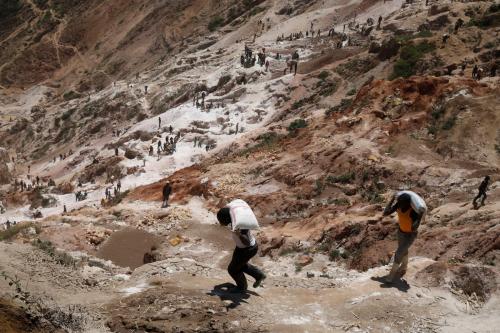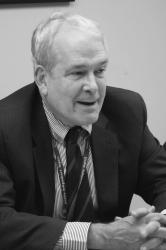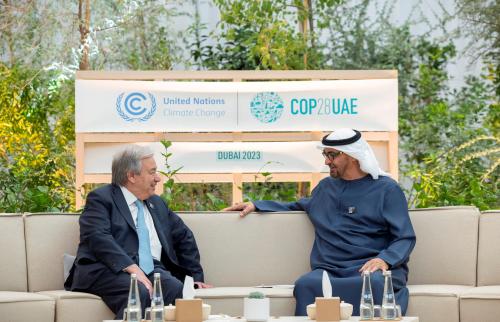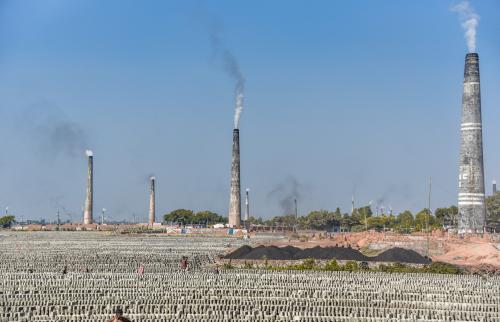

9:30 am EST - 11:00 am EST
Past Event
9:30 am - 11:00 am EST
1775 Massachusetts Ave., NW
Washington, DC
20036
On November 24, 2008 the Brookings Institution and the Heinrich Boell Foundation convened a panel of US and European climate experts to discuss the outlook for the upcoming climate negotiations and the potential new relationship between the United States and Europe on the issue of climate change. The panel examined two aspects of the relationship – the domestic situations on both sides of the Atlantic and how the realities on the ground will play into the international negotiating positions at Copenhagen.
In the United States, President-elect Obama has made it clear that energy is one of his top priorities. This is evident not only in Obama’s own statements but those of his top advisors as well. It was discussed that a key to making the much touted “green recovery” a reality will be how quickly the administration is able to muster the financial resources towards climate friendly investments. Such things as building infrastructure, for example, require a more lengthy time period for project approval to start date.
The newly elected Congress will also play a major role on the progress that will be made on climate policy in the United States. The panel looked at the momentum for a “green recovery” package on Capitol Hill. Components of the package could include such things as public transportation projects with $8 billion in ready to go projects having already been identified by the public transportation community. Financial resources will likely be provided to the states and cities where there is already capacity for funding such things as energy efficiency projects. Other anticipated action from Congress includes a national-wide Renewable Electricity Standard (RES), which has the potential to be enacted fairly quickly The future for cap and trade system is less certain at the moment as not all Senate seats of yet been confirmed and therefore the committee heads are unknown. And while Lieberman/Warner bill received 48 votes in June 2008 there is still much reservation among some in Congress regarding cap and trade. The issues that will be the most contentious and hotly debated for the next cap and trade bill are: cost containment; competitiveness and China; preemption – what do to about the states; the market and using carbon offsets as there is much nervousness about gaming; and the complexity of system and what to do with the revenue.
The panel also discussed the development of the European Emissions Trading Scheme (ETS) and drew out some important lessons for the United States as it develops a cap and trade system. In the initial introductory period of the ETS, a major weakness was the lack of institutional capacity to deal with the scale of the system. The European institutions responsible for the oversight of the allocations simply did not have the manpower to deal with the member state plans when they were originally submitted. Maintaining a balance of power between the EU and Member state governments was also of concern during this initial phase – support for the scheme was fragile – so policy-makers were wary of losing support from any side. The result was a total over allocation of permits which was the cause of the price collapse during the first phase.
The European Commission was much better prepared for the second phase of the ETS – as demonstrated by the fact that they reduced by 10 ½ percent the amount of emissions to be reduced from what was submitted by the EU Member States. The new design for the system is for one overriding body and not patchwork of national plans and the EU has also moved to what is essentially full auctioning. The major lesson for the United States is to anticipate that there will be some problems with the trading at first. Political deals will have to be made initially to move forward, but in the end the system becomes dependent on the market.
Looking forward to Copenhagen then, it was remarked that it will be critical for the United States and Europe to find common ground on comparability and what is expected from the developing world. What financial mechanisms can be advanced to assist with technology transfer. The expectations are high among the international community with Obama’s indications of making climate a top priority. He has garnered a tremendous amount of good from Europe especially and this provides an opportunity for the United States to come back into the negotiations and make a significant difference. Much has been stalled simply because the main player has been absent from the game.
During the discussion much time was spent on the issues of coal and how the EU and the US could engage with China. Coal will continue to be a large part of the energy mix and because both the United States and China have vast reserves of coal this will be at the crux of how both countries deal with climate change. A strong market signal will be necessary to spur investment in the great technological hope for the coal problem – carbon capture and storage (CCS). But coal states in the US are concerned that this signal – a price on carbon – would put coal companies out of business. European heads of state and government agreed in March 2007 to construct 10-12 full scale CCS demonstration plants. However the funding of the plants remains open, as the European Commission has not yet decided on the European Parliaments proposal to finance the projects by 500 million free EU-ETS allowances.
Domestically within the United States the debate over China is not well informed. It may actually be beneficial to U.S. policy-makers to have domestic action moving forward in-step with the international negotiation progress because this may serve to better inform the US debate on China. Policy-makers on both sides of the Atlantic should not think of China as a recipient of hand-outs on the technology transfer, especially on coal technology, as the Chinese are building ultra-super critical coal plants. The West should think of China as a real partner for technology development.
In conclusion, the outlook for progress on climate change in the United States is positive. Looking at Obama actions since taking office and who he has already appointed to key positions it seems that he will set broad terms for the negotiations – he will want policies that are good for the US economy and that are acceptable to developing countries. It must be kept in mind also that education will be necessary throughout the government – the United States has neglected this issue for eight years and has much work to do to catch up.


Tarek Ghani, Juan S. Lozano, Anouk Rigterink, Jacob N. Shapiro
March 13, 2024

David G. Victor
December 7, 2023

Rahul Tongia
November 29, 2023